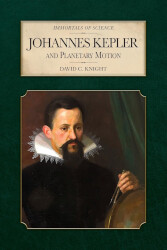Johannes Kepler and Planetary Motion

Author:
David C. Knight
Publication:
1962 by Franklin Watts, Inc
Genre:
Biography, Math, Non-fiction, Science
Series:
Immortals of Science ![]() Members Only (World History)
Members Only (World History)
Pages:
186
Current state:
This book has been evaluated and information added. It has been read but content considerations may not be complete.
Book Guide
Search for this book used on:
JOHANNES KEPLER'S gifted astronomical discoveries forged one of the solidest links in the chain of scientific history. It was he who strengthened the incomplete Copernican cosmological theories by working out the age-old riddle of how the planets really move. And it was through a knowledge of Kepler's Planetary Laws that Isaac Newton was able to formulate his Law of Universal Gravitation.
One of the warmest personalities in the entire history of science, Kepler had to overcome many obstacles — religious intolerance, poverty, petty politics, frail health, ceaseless wars. His mother's trial as a witch impeded his work for years. He had to earn his living largely by making calendars and casting horoscopes. Yet he came into contact with Emperors and highest nobility, among them the great generalissimo of the Thirty Years' War, Wallenstein. Certainly his collaboration with the DAnish observer, Tycho Brahe, is one of the most fascinating chapters in the history of science.
From the book
To view an example page please sign in.
To view awards and booklists please sign in.

![]()
Johannes Kepler and Planetary Motion ![]()
Reprinted in 2025 by Purple House Press
Available formats: Hardcover, Paperback
View on the Purple House Press site
View on Amazon
View on Bookshop.org
Content Guide
Please sign in to access all of the topics associated with this book and view other books with the same topics.
Please sign in to access the locations this book takes place in and view other books in the same location.
Please sign in to access the time periods this book takes place in and view other books in the same time period.
For information about the lead characters please sign in.
Reviews

The Immortals of Science Series
Reviewed by Sara Masarik
These books are of varying lengths based on how much is known about the lives of the subject. Whatever the length, I sped through each one as though it were a suspense novel. How will this one manage to carry on his work in the midst of civil war? How can that one earn the respect of the scientific community so his work can be published for the world? What will be the exciting sequence of events that will lead to the ultimate breakthrough? Will he live long enough to find the answer he has searched for all his life?
The science in these books is written in language any curious reader will be able to understand. The authors don’t condescend, but the writing is not above a confident reader, perhaps ten and above. They would also be interesting enough for reading aloud so they can be shared with the entire family, whatever their ages.
Find This Book
Search for this book used on:


